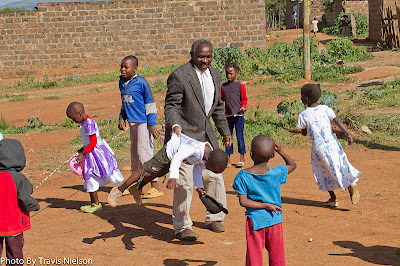 Sunday I took a group of RVA students down to the town of Maahi Mahiu for outreach Sunday school. We walk through the streets and eventually gather a crowd of young kids eager to listen to a Bible story and play football (soccer) with the wazungu (white people). Last spring, there were probably three small house-churches along our route. Interestingly, they just keep cropping up along the six or seven 'blocks' we walk to the large empty lot where we hold our Sunday school class. I'd say that there's been a new church started every month. Just last week, a brand-new frame for a new church sprang up virtually overnight. The total now is nearer to ten. On Sunday mornings, we walk to our Sunday school class amid people carrying plastic chairs into several unmarked house churches and the blare of competing loudspeakers. On the one hand, this is exciting. But it worries me a little.
Sunday I took a group of RVA students down to the town of Maahi Mahiu for outreach Sunday school. We walk through the streets and eventually gather a crowd of young kids eager to listen to a Bible story and play football (soccer) with the wazungu (white people). Last spring, there were probably three small house-churches along our route. Interestingly, they just keep cropping up along the six or seven 'blocks' we walk to the large empty lot where we hold our Sunday school class. I'd say that there's been a new church started every month. Just last week, a brand-new frame for a new church sprang up virtually overnight. The total now is nearer to ten. On Sunday mornings, we walk to our Sunday school class amid people carrying plastic chairs into several unmarked house churches and the blare of competing loudspeakers. On the one hand, this is exciting. But it worries me a little.In Kenya, sometimes churches are just business. A con man will set up shop in a make-shift church claiming to have the power of healing, prophesy, etc... Many even sell miracles. They're easy to condemn. In a poor town like Maahi Mahiu, weekly tithes would supply an attractive salary. Maybe it's a cultural relic of the village witch doctor, but these culturally exciting services attract people.*
Churchgoers in America often fall into a similar trap. I've been guilty of going to church because it's what we do on Sunday mornings. Not for fellowship, growth, or obedience but out of routine because it's a part of my living of the American Dream. If this is my motive for attending church, church becomes stale. Church leaders listen to these complaints. They buy better sound equipment, they employ a worship pastor, they make their sermons more interactive.** These are all good things - great, in fact, but when do we cease to worship God and begin to worship a cultural ideal? How do we strike a balance here?
The real problem is, that when unbelievers look at the American church, they don't see people living lives in obedience to Christ. They see nice sound systems, entertaining programs and multimedia presentations. Young believers see churches claiming to be 'authentic' Christians with Saturday night services led by rock bands with a big stage and fancy lights and they want to be 'authentic' Christians too. After attending, they complain that this new church is impersonal and that nobody notices them so they simply leave. It's all a big show, and it's the gospel we're spreading.
I don't really know what to do about it or how to fix it. I guess I've just been realizing lately that the heros of the New Testament - Jesus, Peter, Paul, John, etc... - were probably a whole lot more like hippies living in tents on the fringes of society than the All-American dads we prop up in our minds. And that last part scares me - because I've spent most of my life so far becoming an All-American dad.
The local pastor who sets up our Sunday School in Maahi Mahiu is named Peter. His perspective on the whole thing is a great example for me. Many of the RVA students are frustrated that the number of children attending has been dropping. We had nearly 80 kids every Sunday early on. Now we only see about 20. "Maybe we need to make it more exciting." Yet Peter is undeterred: "Jesus says even if we have only two, that is enough. Even if it is only just you and me, it is enough. We will be faithful."
Instead of spreading a gospel of the American Dream or one that worships a certain cultural ideal, I want spread a gospel of obedience. Instead of worshiping an entertaining god, I want to worship the God who is present in my daily, boring life. I have a hunch that if I'm obedient, my daily life will rarely be boring. It doesn't matter how I look or what words I use. It's not about becoming a part of the 'authentic' church, the emergent church, the reformed church. It's certainly not about being unique. It's about becoming the Body of Christ.
I want to be more obedient.
*An interesting rabbit-trail: are these churches still cause for celebration? At least people are hearing and if they are seeking after God, that's good, right? Philipians 1:15-18
** Sometimes I forget that the technology world is racing along as we sit here in Kenya. I watched an online sermon the other day, and the congregation was texting the pastor questions during the service - crazy!










